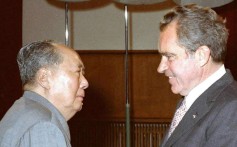Clarity for Beijing and Taipei as Biden team says US will stay with one-China policy

Clarity for Beijing and Taipei as Biden team says US will stay with one-China policy
- Just days after new president was inaugurated, the US expressed support for Taiwan without mentioning ‘one China’ but new announcement confirms position
- As Taiwan establishes office in Guyana, US de facto embassy in Taipei says all countries should be free to pursue closer ties with self-ruled island
as the island tries to further raise its international profile by setting up an office in Guyana.
State Department spokesman Ned Price said there was no change in the United States’ one-China policy, when asked if the new US administration supported that policy.
“Yes … our policy has not changed,” Price said on Wednesday, adding that the Biden administration’s dealings with cross-strait issues were still guided by the one-China policy.
expressed strong support for the self-ruled island in the face of military pressure from Beijing, but stopped short of mentioning the one-China policy.


Analysts said Price’s comments were expected to ease concern from both Beijing and Taipei.
Li Da-jung, a professor of international relations and strategic studies at Tamkang University in Taipei, said that for Beijing, the one-China policy – adopted since Washington switched official recognition to Beijing from Taipei in 1979 – laid out that Beijing was the legitimate government of China.
, and the “Six Assurances”, endorsed since 1982, Li said. This meant the US would continue supporting Taiwan despite a lack of diplomatic relations, he said.
Li said this had been a long-held US policy and Price’s comments meant the Biden administration would continue to observe it in dealing with both Taiwan and the mainland.
“Under such a policy, the US holds the position that Taiwan and the mainland should resolve their disputes through peaceful dialogue,” Li said.
Beijing considers Taiwan a wayward province that must return to the mainland control, by force if necessary.


Price’s remarks came as Taiwan set up a representative office in Guyana as part of its efforts to increase its international visibility in the face of diplomatic squeeze by Beijing.
“An agreement was signed by both sides on January 11, 2021,” Taiwan’s foreign ministry said on Thursday.
“Under the agreement, should Guyana decide eventually to set up an office of equal status in Taiwan, similar conditions and privileges as the Taiwan Office in Guyana shall apply,” it said.
The US applauded the move. Its embassy in Guyana said the office would advance the shared goals of prosperity and security between Taiwan and the South American country.
Julie Chung, acting assistant secretary for the US State Department’s bureau of Western hemisphere affairs tweeted: “This milestone will benefit both partners and advance security, democratic values and prosperity in the region”.
The American Institute in Taiwan – the US de facto embassy on the island, also issued a statement on Thursday, saying all countries should be free to pursue closer ties and greater cooperation with Taiwan.
“The United States remains committed to supporting Taiwan as it expands its international partnerships and works to address global challenges, including Covid-19,” it said.







